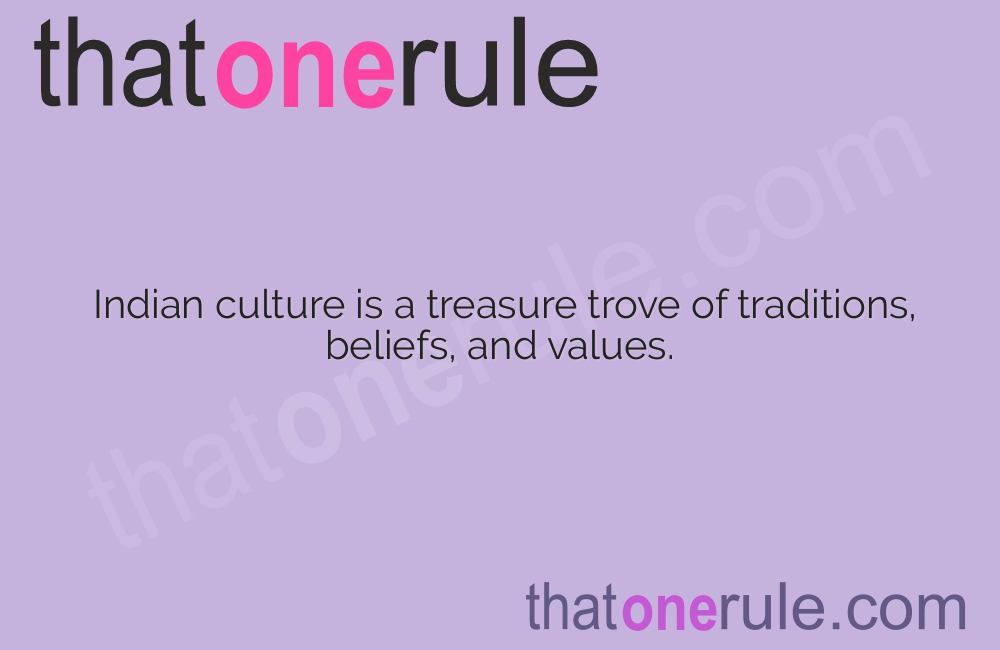Amazing Facts About Indian Culture

Indian culture is a treasure trove of traditions, beliefs, and values.
The diversity within Indian culture is awe-inspiring.
Indian culture revolves around the concept of respect for elders.
The vibrant colors of Indian clothing reflect the zest for life in its culture.
Indian cuisine is known for its rich spices and flavors.
Indian music and dance forms are a captivating part of the culture.
The art of henna painting is a cherished Indian cultural practice.
Yoga and meditation have their roots in Indian culture.
Indian weddings are a grand celebration of love and tradition.
The Taj Mahal stands as an eternal symbol of Indian culture’s architectural brilliance.
Bollywood movies showcase the vibrancy and emotions of Indian culture.
Festivals like Diwali and Holi bring communities together in joyous celebrations.
Indian culture places a strong emphasis on family and community ties.
Ayurveda, an ancient Indian practice, focuses on holistic health and well-being.
The belief in karma and reincarnation is deeply ingrained in Indian culture.
The intricate designs of Indian handicrafts showcase the craftsmanship of its culture.
Indian literature and epic tales like the Mahabharata and Ramayana have profound cultural significance.
Traditional Indian attire, such as sarees and kurta-pajamas, reflect the elegance of the culture.
Indian hospitality is renowned worldwide, as guests are treated with utmost warmth and respect.
Amazing Facts About Indian Culture part 2
The concept of unity in diversity is emblematic of Indian culture’s inclusive nature.
Indian culture values education as a means of personal and societal growth.
Traditional Indian games like chess and kabaddi have their roots in ancient culture.
The traditional Indian art of rangoli involves creating intricate patterns using colored powders or flowers.
Indian culture encourages a balanced lifestyle, encompassing physical, mental, and spiritual well-being.
The philosophy of nonviolence, propagated by Mahatma Gandhi, remains an integral part of Indian culture.
Classical Indian dance forms like Bharatanatyam and Kathak mesmerize audiences with their grace and storytelling.
Indian culture respects nature and reveres animals, as seen in the worship of cows and elephants.
Indian culture embraces the concept of Atithi Devo Bhava, meaning the guest is equivalent to God.
Traditional Indian weddings involve elaborate rituals, symbolizing the union of two families.
Indian culture’s love for storytelling can be witnessed through its rich folklore and mythology.
The intricate craftsmanship of Indian jewelry is a testament to the culture’s attention to detail.
The ancient healing science of Ayurveda emphasizes the connection between mind, body, and spirit.
Indian culture places great importance on respecting and honoring teachers and gurus.
Indian classical music, with its unique ragas and talas, evokes deep emotions and spiritual experiences.
Traditional Indian architecture, like the stepwells and temples, showcases the grandeur of the culture.
Indian culture celebrates different forms of art, including sculpture, pottery, and painting.
The diverse languages spoken across India reflect the cultural richness and linguistic heritage of the country.
Indian culture believes in the concept of Vasudhaiva Kutumbakam, meaning the world is one family.
Traditional Indian street food, like samosas and chaat, offers a burst of flavors and spices.
Indian culture’s emphasis on greeting others with folded hands and saying Namaste signifies respect and humility.
The art of mehndi (henna) symbolizes joy, prosperity, and good luck in Indian culture.
Indian cultural dances like Bhangra and Garba celebrate the harvest season with energetic movements and vibrant music.
The practice of yoga originated in India and has gained worldwide popularity, promoting physical and mental well-being.
Indian culture’s reverence for nature can be seen in the celebration of festivals like Pongal, thanking the Sun God for a bountiful harvest.
The holy river Ganges holds immense cultural and religious significance for the people of India, reflecting their deep-rooted spirituality.

